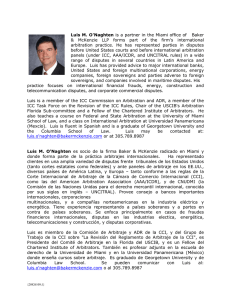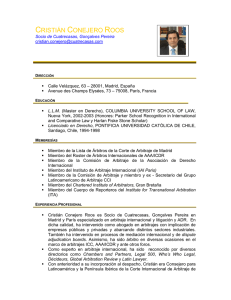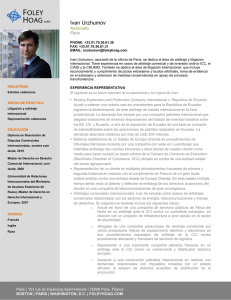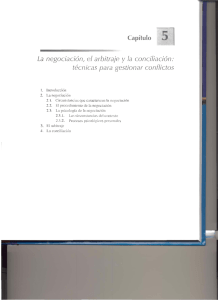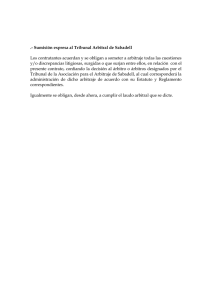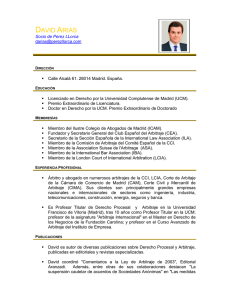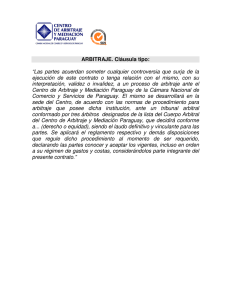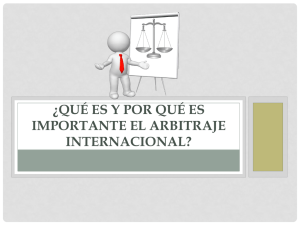los acuerdos de arbitraje patológicos
Anuncio
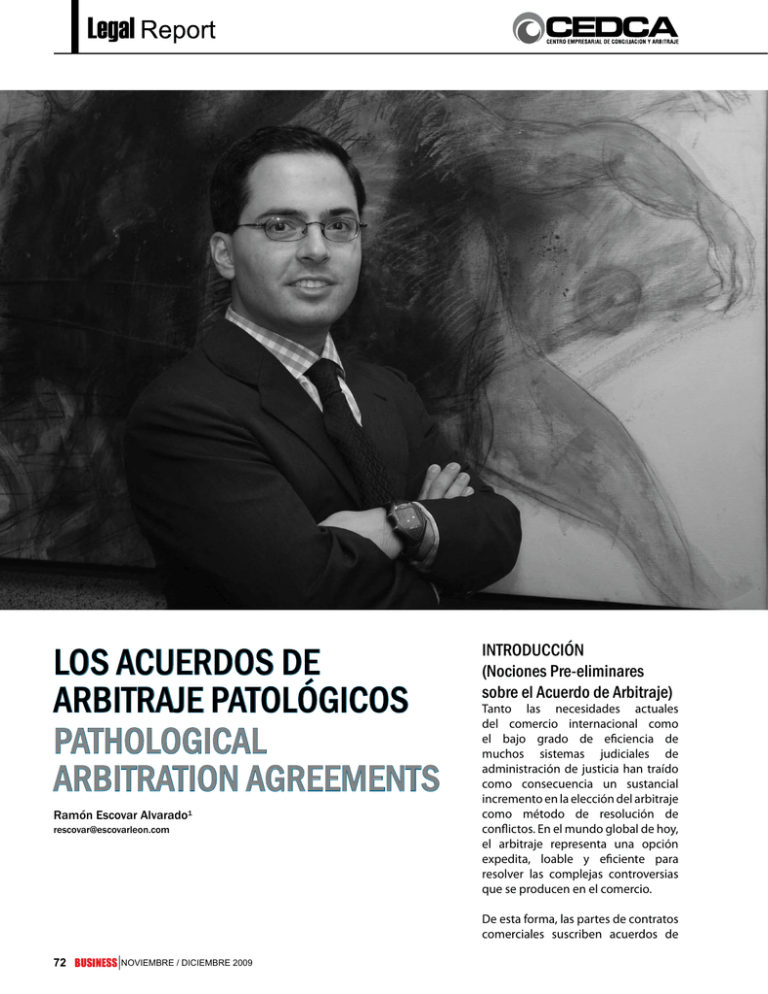
LOS ACUERDOS DE ARBITRAJE PATOLÓGICOS PATHOLOGICAL ARBITRATION AGREEMENTS Ramón Escovar Alvarado1 [email protected] INTRODUCCIÓN (Nociones Pre-eliminares sobre el Acuerdo de Arbitraje) Tanto las necesidades actuales del comercio internacional como el bajo grado de eficiencia de muchos sistemas judiciales de administración de justicia han traído como consecuencia un sustancial incremento en la elección del arbitraje como método de resolución de conflictos. En el mundo global de hoy, el arbitraje representa una opción expedita, loable y eficiente para resolver las complejas controversias que se producen en el comercio. De esta forma, las partes de contratos comerciales suscriben acuerdos de 72 NOVIEMBRE / DICIEMBRE 2009 arbitraje, de manera que cualquier controversia acerca de su relación contractual o no contractual sea resuelta a través de procedimientos de arbitraje comercial (excluyendo por vía de consecuencia a la jurisdicción de los tribunales judiciales). Pues, salvo en algunas de las modalidades específicas del arbitraje estipulado por tratados de inversión, el acuerdo de arbitraje es sin duda alguna la génesis de todo proceso arbitral. La Ley de Arbitraje Comercial (la “Ley de Arbitraje”) define el acuerdo de arbitraje como aquel por medio del cual “las partes deciden someter a arbitraje todas o algunas de las controversias que hayan surgido o puedan surgir entre ellas respecto de una relación jurídica contractual o no contractual2. Paradójicamente, éste se caracteriza por ser un acuerdo de naturaleza contractual con efectos procesales, toda vez que conlleva a que cualquier controversia relacionada con el contrato se resuelva mediante arbitraje3. Su propósito no es otro que evidenciar el consentimiento de las partes de someterse a arbitraje. Por esta razón, el acuerdo de arbitraje debe cumplir con una serie de requisitos fundamentales para su validez, a saber: (i) las partes deben detentar capacidad para firmar el referido acuerdo; (ii) debe constar por escrito; (iii) versar sobre una relación legal definida (contractual o no contractual); y (iv) referirse a controversias que puedan ser resueltas por arbitraje. Asimismo, debe ser válido en congruencia con la ley que las partes lo han sometido o, a falta de ello, con la ley del lugar donde el laudo es dictado (lex arbitri). A pesar de la importancia determinante del acuerdo de arbitraje, las partes suelen cometer errores en su redacción. Estos errores pueden acarrear un eventual desconocimiento jurisdiccional de la voluntad de ir a arbitraje. En el presente trabajo analizamos sucintamente los errores más comunes en la redacción de los acuerdos arbitrales. I CLÁUSULAS DE ARBITRAJE PATOLÓGICAS El término “acuerdos arbitrales patológicos” se refiere a aquellos acuerdos de arbitraje que detentan defectos capaces de generar inconvenientes en el normal desarrollo de un procedimiento arbitral4. Los principales defectos de redacción de los acuerdos de arbitrajes son: (a) optatividad; (ii) falta de certeza; y (iii) inoperancia5. A continuación detallaremos cada uno de ellos: A. Acuerdos de Arbitrajes Optativos: Un acuerdo de arbitraje es optativo en el caso de que no excluya la jurisdicción de los tribunales judiciales, esto es, cuando otorga a las partes la opción de someter sus controversias indistintamente a arbitraje o a tribunales judiciales. Por ejemplo, en un contrato en el que la cláusula de resolución de controversia establezca que: “Todas la divergencias que surgieren entre las partes con motivo del presente contrato deberán en lo posible ser resueltas Introduction (Preliminary Notions about the Arbitration Agreement) Both the current needs of international trade as well as the low degree of efficiency of many justice administration systems have resulted in a substantial increase of arbitration as the preferred choice of conflict resolution. In today’s global world, arbitration represents an expedite, laudable and efficient option for the resolution of the complex controversies that result from trade. Thus, the parties of commercial agreements enter into arbitration agreements, so that any controversy related to their contractual or non contractual relationship is resolved through commercial arbitration proceedings (therefore excluding the jurisdiction of the courts). Except for certain specific modes of the arbitration provided in investment treaties, the arbitration agreement is without a doubt, the genesis of every arbitration procedure. The Commercial Arbitration Law (the “Arbitration Law”) defines the arbitration agreement as the agreement whereby “the parties agree to submit to arbitration all or some of the controversies resulting or that may result between them with respect to a contractual or non contractual legal relationship2. Paradoxically, this agreement is contractual in nature but with procedural effects since any contract related controversy is to be resolved though arbitration3. Its purpose is to evidence the agreement of the parties to submit to arbitration. For this reason, to be valid, the arbitration agreement has to meet a number of fundamental requirements: (i) the parties must be competent to enter into such agreement; (ii) the agreement must be in writing; (iii) the agreement must be about a defined legal relationship (contractual or non contractual); and (iv) it must refer to controversies that may be resolved through arbitration. In addition, it must comply with the laws to which the parties have submitted it, or in the lack thereof, with the laws of the place where the arbitration award (lex arbitri) is awarded. Notwithstanding the fundamental importance of the arbitration agreement, the parties usually make mistakes in its drafting. These mistakes can result in an eventual jurisdictional failure to recognize the desire of the parties to enter into arbitration. This work is a concise analysis of the most common mistakes in drafting arbitration agreements. I PATHOLOGICAL ARBITRATION CLAUSES The term “pathological arbitration agreements” refers to arbitration agreements that include defects capable of creating problems in the normal development of an arbitration agreement4. The principal drafting mistakes of arbitration agreements are: (a) optionality; (ii) lack of certainty; and (iii) inoperativeness5. A.Optional Arbitration Agreements: An arbitration agreement is optional when it does not exclude the jurisdiction of the courts, that is, when it gives the parties the option of indistinctly submitting their controversies either to arbitration or to the courts. For example, a controversy resolution clause of an agreement that provides that: “All differences that arise between the parties on the basis of this agreement shall, to the extent possible, be resolved through Arbitration at Law that shall take place in the city of Caracas; but in the lack thereof and as last instance, the parties may resort to the judicial procedure”. An arbitration agreement may also become optional if another contractual clause – other than the arbitration clause– grants jurisdiction to the courts on any other matter related to the agreement in question. That is, the optional nature may be present whether in the wording of the arbitration agreement itself or may result from another contractual clause. These kind of agreements are characterized in practice as pathological. NOVIEMBRE / DICIEMBRE 2009 73 a través de Arbitraje de Derecho el cual se llevará a cabo, en la ciudad de Caracas; pero, en su defecto y como última instancia, las partes podrán recurrir a la vía judicial.” Un acuerdo de arbitraje también puede devenir en optativo, en el caso de que otra cláusula contractual –distinta a la cláusula arbitral– otorgue jurisdicción a los tribunales judiciales para conocer de algún asunto relacionado con el contrato en cuestión. Es decir, el carácter optativo puede estar presente bien el texto del propio acuerdo arbitral o bien ser el resultado de otra cláusula contractual. Este tipo de acuerdos son caracterizados en la práctica como patológicos. La jurisprudencia de la Sala Político-Administrativa del Tribunal Supremo de Justicia venezolano (la “SPA”) ha considerado que los acuerdos de arbitraje optativos carecen de validez. Su criterio pacífico sobre el tema ha sido que para que el acuerdo de arbitraje sea válido es necesario que éste evidencie una “incuestionable”, “indubitable” y “expresa” voluntad de las partes de someterse a arbitraje y de renunciar a los jurisdicción de los tribunales judiciales ordinarios6. B. Acuerdo de Arbitrajes que carezca de certeza: Un acuerdo de arbitraje carece de certeza en el supuesto de que sus términos sean vagos e imprecisos. Por ejemplo, en supuestos de arbitraje comercial internacional en los que exista un error sustancial en la determinación del centro de arbitraje seleccionado para administrar el procedimiento arbitral. Un caso claro sería el de un acuerdo de arbitraje que disponga que cualquier controversia entre las partes será resuelta por arbitraje de Derecho según las normas de un inexistente centro de arbitraje. Sin embargo, se debe tener presente que no existe una regla general para resolver la problemática de la falta de certeza en los acuerdos de arbitraje. El hecho de que un acuerdo de arbitraje carezca de certeza no implica per se que el mismo es nulo o ineficaz. Todo dependerá del grado defecto en el caso en concreto. C. Acuerdos de Arbitraje Inoperantes o Inejecutables: Un acuerdo de arbitraje se torna inoperante cuando, por ejemplo, ha expirado algún término para iniciar o concluir el proceso arbitral. Adicionalmente, puede hablarse de un acuerdo de arbitraje inoperante el caso de que éste sea redactado en términos excesivamente pormenorizados y, por ende, se haga prácticamente imposible su ejecución. Esto último ocurriría en el hipotético supuesto de que la cláusula arbitral haya determinado a priori las personas que integrarán el tribunal arbitral y en el momento en que la controversia tenga lugar, éstas hayan fallecido. También puede suceder en el caso que se establezca requisitos excesivamente exigentes para integrar el tribunal 74 NOVIEMBRE / DICIEMBRE 2009 The jurisprudence of the Political-Administrative Chamber of the Venezuelan Supreme Court of Justice (the “PAC”) has ruled that optional arbitration agreements lack validity. Its pacific criteria on the subject matter provides that for an arbitration agreement to be valid, it is necessary that such agreement evidences the “unquestionable”, “undoubted” and “express” desire of the parties to submit to arbitration and to waive the jurisdiction of the ordinary courts6. B. Arbitration Agreements that lack certainty: An arbitration agreement lacks certainty if its terms are vague or imprecise. For example, in suppositions of international commercial arbitration having a substantial error regarding the determination of the arbitration center where the arbitration procedure is to be conducted. A clear example would be an arbitration agreement that provides that any controversy of the parties shall be resolved by arbitration at law pursuant to the rules of an inexistent arbitration center. However, it is important to keep in mind that there is no general rule to resolve lack of certainty problems in arbitration agreements. The fact that an arbitration agreement lacks certainty does not mean, per se, that the agreement is null or void. It will depend on the degree of the defect in each particular case. C.Inoperative or unenforceable arbitration agreements: An arbitration agreement becomes inoperative, for example, when any term to begin or conclude an arbitration procedure has expired. Another inoperative arbitration agreement would be the case of an agreement drafted in excessively detailed terms which render its performance practically impossible. This would happen in the hypothetical event of an arbitration clause that determines, a priori, the persons that will conform the arbitration court and have died at the time the controversy takes place. It can also happen with clauses that require excessively demanding requirements to conform the arbitration court. For example, “….the arbitration court will consist only of attorneys with Doctorates in Hydrocarbon Law, with experience of at least 40 years in the area and five published books on legal matters related to the subject matter …”. II INTERPRETATION OF THE ARBITRATION AGREEMENT One of the first problems of an arbitration procedure is when, notwithstanding any defects of the arbitration clause (i.e. – optionality, lack of certainty or inoperativeness) the parties participate in the arbitration. Even though the arbitration court shall determine whether the defect is of such magnitude that it becomes impossible to determine if the true intention of the parties was to submit their controversies to arbitration; it is advisable that the parties reassert their desire to submit themselves to arbitration and correct any defects. We insist: the defects and pathologies of arbitration agreements can be remedied if the parties reassert in writing their desire to submit to arbitration. Therefore, the reassertion of the desire to submit to arbitration is useful to correct any defect of form and to armor the arbitration procedure against any mechanism to challenge an eventual award by the non prevailing party. However, it is important to note that both the jurisprudence as well as the compared doctrine has stated that when one of the parties participates in the arbitration procedure without denying the existence of an arbitration procedure there is a tacit consent to arbitration and consequently, no defects of form may be argued to challenge the arbitration procedure7. In any event, the issue about the defects of the arbitration agreement is, in essence, an issue of legal interpretation. The Venezuelan constitutional rules provide the application of a pro-arbitration interpretation. Thus, any doubts must be resolved in favor arbitral. Por ejemplo, “….el tribunal arbitral será integrado únicamente por abogados con Doctorado en Derecho de Hidrocarburos, con experiencia de al menos 40 años en el área y con cinco libros publicados sobre temas jurídicos relacionados con la materia…”. II La interpretación del Acuerdo de Arbitraje Uno de los primeros inconvenientes de un proceso arbitral se presenta cuando, a pesar que la cláusula de arbitraje tiene algún defecto (vg.r optatividad, falta de certeza o inoperancia), las partes participan en el arbitraje. Aunque el tribunal arbitral deberá dictaminar si el defecto es de tal magnitud que sea imposible determinar si la verdadera intención fue someter sus controversias a arbitraje, es recomendable que las partes reafirmen su voluntad de ir arbitraje y corrijan los defectos. Insistimos: los defectos y patologías de los acuerdos arbitrales pueden ser solventados si las partes reafirman por escrito su voluntad de ir arbitraje. De manera tal que la reafirmación de la voluntad de ir arbitraje sirve para subsanar cualquier defecto formal y blindar al proceso arbitral de cualquier mecanismo de impugnación de la parte perdidosa del eventual laudo. Ahora bien, en este sentido debemos destacar que tanto la jurisprudencia como la doctrina comparada son del criterio que cuando una de las partes participa en el proceso arbitral sin negar la existencia de un acuerdo de arbitraje se produce el consentimiento tácito al arbitraje y, por ende, eventualmente no podrán ser alegados defectos de forma para atacar el procedimiento arbitral7. A todo evento, el problema de los defectos del acuerdo de arbitraje es, en esencia, un tema de interpretación jurídica. Las normas constitucionales venezolanas ordenan la aplicación de una interpretación pro-arbitraje. Según ésta, cualquier duda debe ser resuelta a favor del arbitraje, es decir, de manera de expandir y dar eficacia práctica al derecho fundamental de los justiciables a ir a arbitraje8. Un avance de la Constitución de la República de 1999 es haber concebido un sistema de justicia integrado de dos vías: la arbitral y la judicial. Por tanto, cualquier restricción irrazonable de alguna de ellas se traduce en la vulneración del derecho al acceso a la justicia y todos sus corolarios (tutela judicial efectiva, derecho a la defensa y debido proceso). CONCLUSIONES 1.El Acuerdo de Arbitraje es aquel a través del cual las partes deciden someter a arbitraje sus controversias. Posee un carácter exclusivo y excluyente de la jurisdicción de los tribunales judiciales ordinarios. of arbitration, in order to expand and give practical efficiency to the fundamental right of resorting to arbitration8. An advancement achieved by the 1999 Venezuelan Constitution is the definition of a justice system consisting of two alternatives: judicial and arbitral. Thus, any unreasonable restriction of any of such alternatives implies a violation of the right of access to justice and its corollaries (effective judicial protection, right to defense and due process). CONCLUSIONS 1.An Arbitration Agreement is an agreement whereby the parties decide to submit their controversies to arbitration. It is of an exclusive nature that excludes the jurisdiction of ordinary courts. 2.The term “pathological arbitration agreements” refers to arbitration agreements having defects that may hinder the normal development of the arbitration procedure. The principal defects of form are: (a) optionality; (ii) lack of certainty; and (iii) inoperativeness. However, any defect may be remedied if the parties reaffirm their desire to submit to arbitration in writing. 3.According to the constitutional rules, any doubts about the arbitration institution shall be resolved in a way that expands and gives practical efficiency to the fundamental right of resorting to arbitration. Pursuant to the Constitution, the justice system includes two choices: arbitration and litigation. Thus, any unreasonable restriction of any of the above implies a violation of the constitutional rights of the parties. Universidad Católica Andrés Bello (“UCAB”), Attorney. New York University (United States of America) Master in Comparative Law. Professor, International Private Law, UCAB, Law Faculty. Practices Law at Escovar León Abogados S.C. 1 In this respect it is important to note the provisions of the most relevant International Commercial treaties and conventions in force in Venezuela; that is: the United Nations Convention on the Recognition and Enforcement of Foreign Arbitral Awards dated June 10, 1958, (the “New York Convention”) and the Inter American Convention on International Commercial Arbitration dated June 16, 1976 (the “Panama Convention”). Thus, Article II.3 of the New York Convention defines the arbitration agreement as the agreement whereby its parties agree to “submit to arbitration all or any differences which have arisen or which may arise between them in respect of a defined legal relationship, whether contractual or not, concerning a subject matter capable of settlement by arbitration”. On its part, Article 1 of the Panama Convention, refers to “an agreement in which the parties undertake to submit to arbitral decision any differences that may arise or have arisen between them with respect to a commercial relation”. 2 See HERNÁNDEZ-BRETÓN, Eugenio: Algunas Cuestiones de Derecho Internacional Privado del Arbitraje Comercial Internacional, In: Libro Homenaje a Gonzalo Parra Aranguren, Tribunal Supremo de Justicia, Caracas, 2001, Volume I, p. 486 3 This is the definition proposed by FOUCHARD, GAILLARD and GOLDMAN, who also note that the term was coined in 1974 by Frédéric Eismann, Honorary Secretary of the Arbitration Court of the International Commercial Chamber–the ICC, See: GAILLARD, Emmanuel and SAVAGE John: Fouchard Gaillard Goldman on International Arbitration, Kluwer Law International, Paris, 1999, pp. 262. 4 The terms inconsistency, lack of certainty and inoperativeness are analyzed by REDFERN, HUNTER, BLACKABY and PARTASIDES: Law and Practice of International Commercial Arbitration, London, Thomson, 2004, 4th Edition, pp. 165. 5 See judgment Hoteles Doral and judgment of PAC dated April 11, 2003, In Re: Consorcio Barr v. Four Seasons. 6 See: GAILLARD, Emmanuel and SAVAGE John: Op Cit. pp. 361; REDFERN, HUNTER, BLACKABY and PARTASIDES: op. cit., p. 135. 7 About the fundamental right to arbitration, see: HERNÁNDEZ-BRETÓN, Eugenio: Arbitraje y Constitución: El arbitraje como derecho fundamental, In: Arbitraje Comercial Interno e internacional, Reflexiones Teóricas y experiencias prácticas, Caracas, Academia de Ciencias Políticas y Sociales, 2005, p. 27 8 2.El término “acuerdos arbitrales patológicos” se refiere a aquellos acuerdos de arbitrales que detentan defectos capaces de generar inconvenientes en el normal desarrollo NOVIEMBRE / DICIEMBRE 2009 75 del procedimiento arbitral. Los principales defectos de forma son: (a) optatividad; (ii) falta de certeza; y (iii) inoperancia. No obstante, cualquier defecto puede ser solventado si las partes reafirman por escrito su voluntad de ir arbitraje. 3.Según las normas constitucionales, las dudas acerca de la institución arbitral deben ser resueltas de manera de expandir y dar eficacia práctica al derecho fundamental de los justiciables a ir a arbitraje. De acuerdo con la Constitución de la República, el sistema de justicia está integrado de dos vías: la arbitral y la judicial. Por tanto, cualquier restricción irrazonable de alguna de ellas se traduce en la vulneración de los derechos constitucionales del justiciable. Universidad Católica Andrés Bello (“UCAB”), Abogado. Universidad de Nueva York (Estados Unidos de América) Master en Derecho Comparado. Profesor de Derecho Internacional Privado de la Facultad de Derecho de la UCAB. Ejerce el Derecho en Escovar León Abogados S.C. 1 Sobre este particular hay que tener en cuenta lo dispuesto por los más relevantes tratados y convenciones internacionales de Arbitraje Comercial Internacional vigentes en Venezuela sobre la materia, a saber: la Convención de las Naciones Unidas sobre Reconocimiento y Ejecución de las Sentencias Arbitrales Extranjeras de 10 junio de 1958 (“Convención de Nueva York”) y la Convención Interamericana sobre Arbitraje Comercial Internacional de 16 de junio de 1976 (“Convención de Panamá”). Así, la Convención de Nueva York, a través de su artículo II.3, se refiere al acuerdo de arbitraje como aquel conforme al cual las partes se obligan “a someter a arbitraje todas las diferencias o ciertas diferencias que hayan surgido o puedan surgir entre ellas respecto a una determinada relación contractual o no contractual concerniente a un asunto que pueda ser resuelto por arbitraje”. Por su parte, la Convención de Panamá, en su artículo 1, habla del “acuerdo de las partes en virtud del cual se obligan a someter a decisión arbitral las diferencias que pudiesen surgir o que hayan surgido entre ellas en relación a un negocio de carácter mercantil”. 2 Véase HERNÁNDEZ-BRETÓN, Eugenio: Algunas Cuestiones de Derecho Internacional Privado del Arbitraje Comercial Internacional, En: Libro Homenaje a Gonzalo Parra Aranguren, Tribunal Supremo de Justicia, Caracas, 2001, Tomo I, p. 486 3 Esta es la definición propuesta por FOUCHARD, GAILLARD y GOLDMAN, quienes además apuntan que el término fue originariamente acuñado en 1974 por Frédéric Eismann, Secretario honorario de la Corte de Arbitraje de la Cámara de Comercio Internacional –conocida por su siglas en inglés ICC-, Véase: GAILLARD, Emmanuel and SAVAGE John: Fouchard Gaillard Goldman on International Arbitration, Kluwer Law International, Paris, 1999, pp. 262. 4 Los términos de inconsistencia, falta de certeza e inoperancia son analizados por REDFERN, HUNTER, BLACKABY y PARTASIDES: Law and Practice of International Commercial Arbitration, London, Thomson, 2004, 4ta Edición, pp. 165. Instrucción de la Causa en el procedimiento arbitral CEDCA Según lo previsto en el Reglamento de CEDCA, el Tribunal Arbitral instruirá la causa en el tiempo más breve posible de acuerdo con el procedimiento convenido por las partes. En caso de no lograrse acuerdo, el Tribunal Arbitral podrá, sujeto a la normativa de CEDCA, dirigir la instrucción de la causa del modo que considere más adecuado. Dicha facultad otorgada al Tribunal se extiende a determinar la admisibilidad, el modo, lugar y tiempo para la evacuación de las pruebas, así como su valoración. A solicitud de parte o de oficio, el Tribunal Arbitral podrá una vez examinados los escritos y documentos presentados por las partes, ordenar un debate oral de los mismos. Igualmente, podrá en todo momento durante el arbitraje, requerir a las partes que aporten pruebas adicionales. La terminación de la instrucción de la causa, será declarada por el Tribunal cuando éste considere que las partes han tenido oportunidad suficiente para demostrar sus alegatos y, una vez declarada la terminación de la instrucción no se admitirán nuevas pruebas, salvo requerimiento o autorización expresa del Tribunal Arbitral. 5 A titulo ilustrativo ver la sentencia Hoteles Doral y la sentencia de la SPA de fecha 11 de abril de 2003, caso: Consorcio Barr v. Four Seasons. 6 Véase: GAILLARD, Emmanuel and SAVAGE John: Op Cit. pp. 361; REDFERN, HUNTER, BLACKABY and PARTASIDES: op. cit., p. 135. 7 Sobre el derecho fundamental al arbitraje véase: HERNÁNDEZ-BRETÓN, Eugenio: Arbitraje y Constitución: El arbitraje como derecho fundamental, En: Arbitraje Comercial Interno e internacional, Reflexiones Teóricas y experiencias prácticas, Caracas, Academia de Ciencias Políticas y Sociales, 2005, p. 27 8 76 NOVIEMBRE / DICIEMBRE 2009 Centro Empresarial de Conciliación y Arbitraje (CEDCA) Centro Empresarial de Conciliación y Arbitraje (CEDCA) CONTACTENOS 2sa. Avenida de Campo Alegre, Torre Credival Piso 6. Caracas Teléfono / Phone: 263.08.33, Ext.: 220 - 221 - 152 www.cedca.org.ve [email protected]

